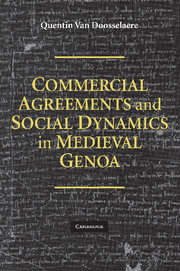Book contents
- Frontmatter
- Contents
- List of Figures
- List of Tables
- Abbreviations
- Acknowledgments
- 1 From Sword into Capital
- 2 Genoa at the Dawn of the Commercial Expansion
- 3 Equity Partnerships for Heterogeneous Ties
- 4 Credit Network for Routinized Merchants
- 5 Insurance Ties for Oligarchic Cohesion
- 6 Conclusion
- Appendix A Sample of Prices and Income
- Appendix B Sample of Long-Distance Trade Participants' Occupations
- Appendix C Commenda Network Graphs
- Appendix D Nodal Degree Distributions of Commenda Networks
- Appendix E List of Top Mercantile Nonaristocratic Families
- Appendix F Partner Selection Probability Model
- Bibliography
- Index
4 - Credit Network for Routinized Merchants
Published online by Cambridge University Press: 31 August 2009
- Frontmatter
- Contents
- List of Figures
- List of Tables
- Abbreviations
- Acknowledgments
- 1 From Sword into Capital
- 2 Genoa at the Dawn of the Commercial Expansion
- 3 Equity Partnerships for Heterogeneous Ties
- 4 Credit Network for Routinized Merchants
- 5 Insurance Ties for Oligarchic Cohesion
- 6 Conclusion
- Appendix A Sample of Prices and Income
- Appendix B Sample of Long-Distance Trade Participants' Occupations
- Appendix C Commenda Network Graphs
- Appendix D Nodal Degree Distributions of Commenda Networks
- Appendix E List of Top Mercantile Nonaristocratic Families
- Appendix F Partner Selection Probability Model
- Bibliography
- Index
Summary
The previous chapter showed that, before the end of the thirteenth century, the Genoese who participated in the long-distance trade were, for the most part, multivalent actors. In that context, commenda contracts were an efficient norm-based framework that fostered heterogeneity of ties. However, the mercantile routinization and specialization that had already developed in a few other European regions was emerging in Genoa, and credit was increasingly defining the relationships between local specialized operators. So, whereas we have been so far concerned primarily with those Genoese whose occasional participation created the conditions for the commercial revolution, this fourth chapter focuses on those for whom, in increasing numbers, long-distance trade became a main occupation and career.
It is the emergence of these merchants' networks that Braudel singles out to explain the rise of capitalism in late medieval Italian city-states. Brushing aside alternative explanations, such as the rise of agricultural productivity, the demographic impulse of the late Middle Ages, and the rise of protoindustrialization, he notes that long-distance trade was “the only area which favored the reproduction of capital” (1992, p. 239). Accordingly, he firmly assigns the origin of the sustained accumulation of financial resources to those who were increasingly able to dominate long-distance trade through their deployment of specialized networks – around the Mediterranean first and across the rest of the world next – in order to take advantage of the differences of price in space and time.
- Type
- Chapter
- Information
- Commercial Agreements and Social Dynamics in Medieval Genoa , pp. 118 - 169Publisher: Cambridge University PressPrint publication year: 2009

